外研版(2019)选择性必修第二册 Unit4 Breaking boundaries Developing ideas-writing 公开课课件(共30张PPT)
文档属性
| 名称 | 外研版(2019)选择性必修第二册 Unit4 Breaking boundaries Developing ideas-writing 公开课课件(共30张PPT) |  | |
| 格式 | pptx | ||
| 文件大小 | 1020.6KB | ||
| 资源类型 | 教案 | ||
| 版本资源 | 外研版(2019) | ||
| 科目 | 英语 | ||
| 更新时间 | 2023-03-03 22:12:48 | ||
图片预览

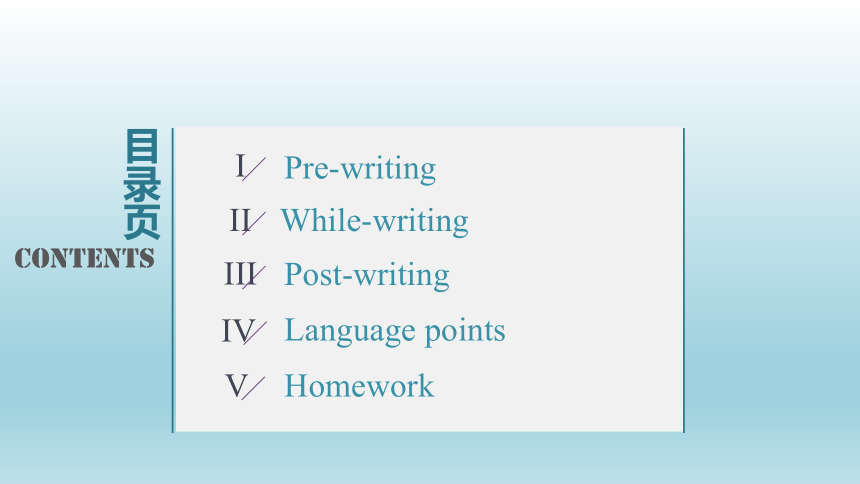
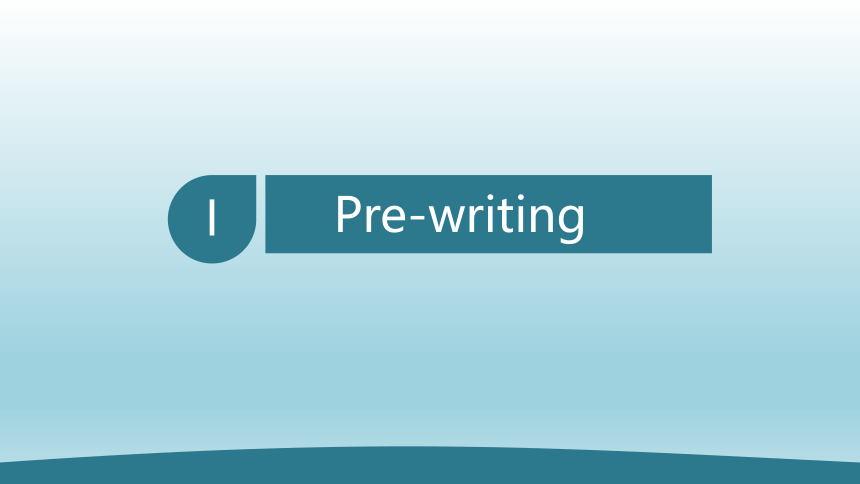

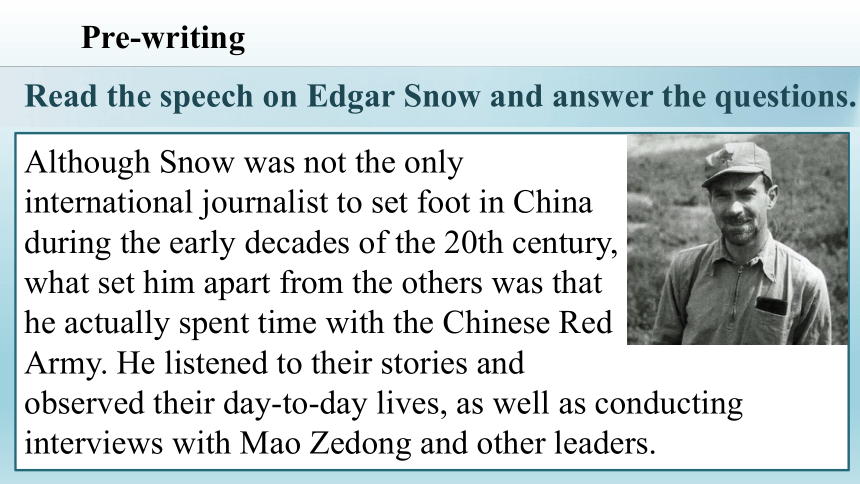
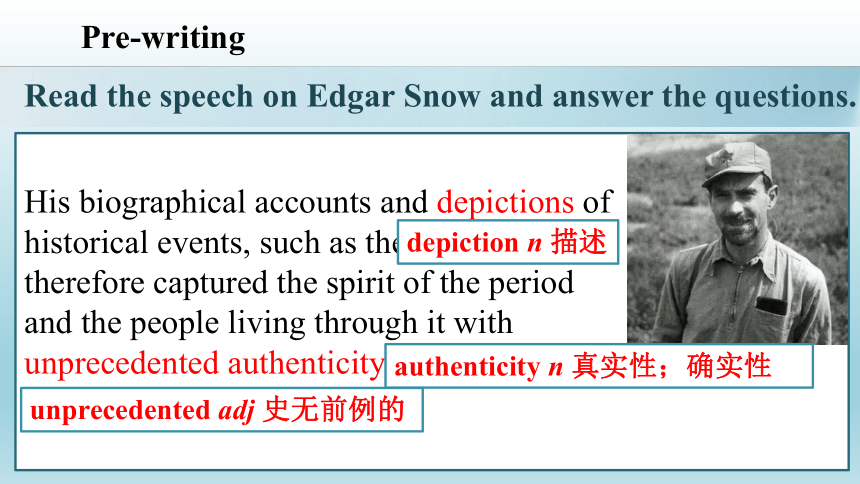
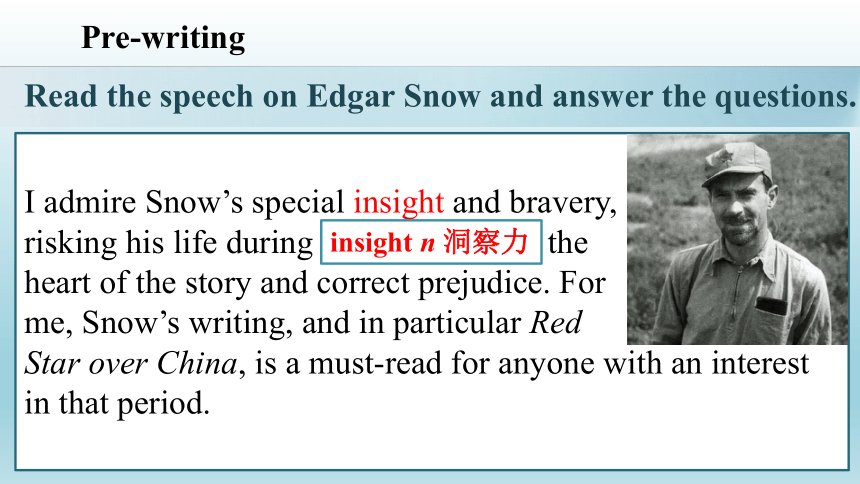
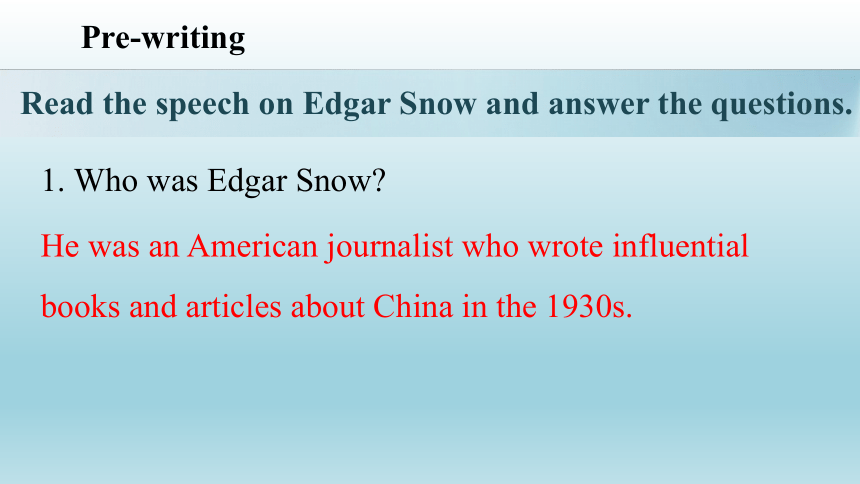
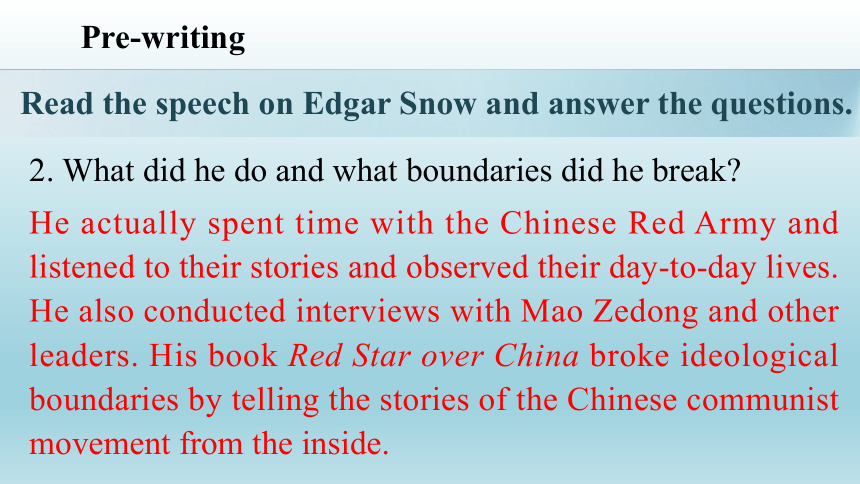
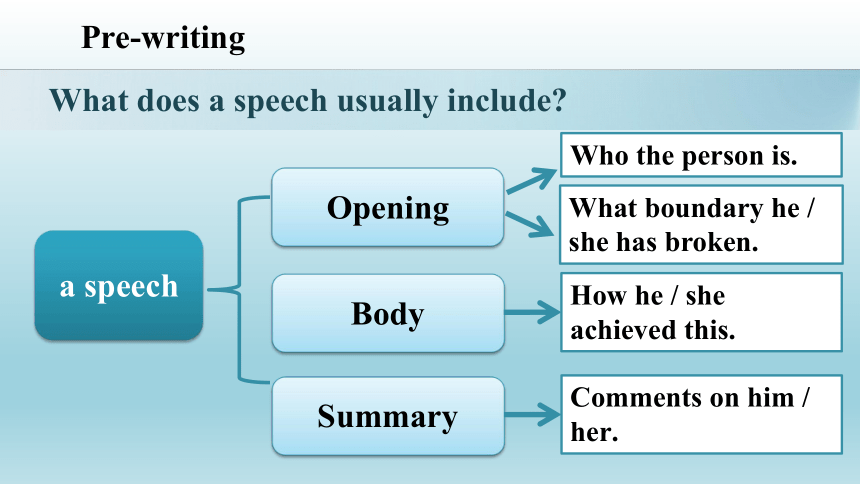

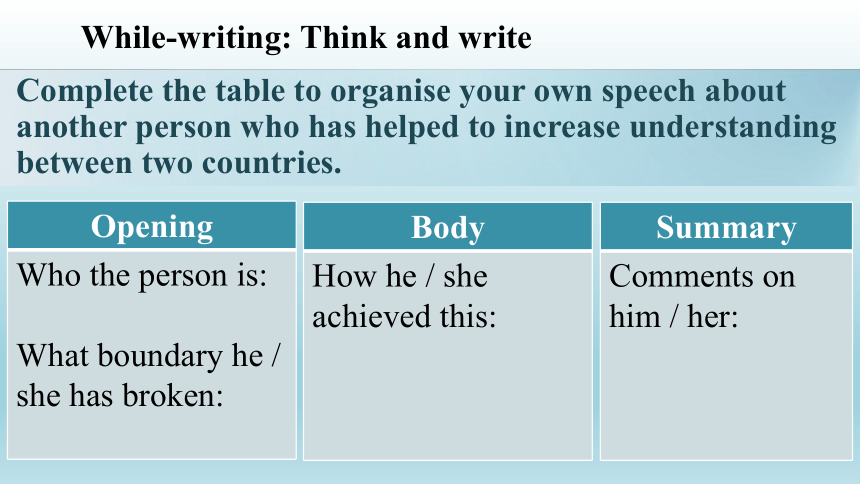
文档简介
(共30张PPT)
Developing ideas — writing
Unit 4 Breaking boundaries
目录页
contents
Pre-writing
I
While-writing
II
Homework
Ⅳ
Post-writing
III
V
Language points
I
Pre-writing
Read the speech on Edgar Snow and answer the questions.
Pre-writing
Hello, everyone. Today, I’m going to
introduce Edgar Snow. Edgar Snow was
an American journalist who wrote influential
books and articles about China in the 1930s.
At a time when relatively little was known
about our country in the Western world, his 1937 book Red Star over China broke ideological boundaries by telling the stories of the Chinese communist movement from the inside.
influential adj 有影响力的
Read the speech on Edgar Snow and answer the questions.
Pre-writing
Although Snow was not the only
international journalist to set foot in China
during the early decades of the 20th century,
what set him apart from the others was that
he actually spent time with the Chinese Red
Army. He listened to their stories and
observed their day-to-day lives, as well as conducting interviews with Mao Zedong and other leaders.
Read the speech on Edgar Snow and answer the questions.
Pre-writing
His biographical accounts and depictions of
historical events, such as the Long March,
therefore captured the spirit of the period
and the people living through it with
unprecedented authenticity. Snow is considered “our American friend”.
depiction n 描述
unprecedented adj 史无前例的
authenticity n 真实性;确实性
Read the speech on Edgar Snow and answer the questions.
Pre-writing
I admire Snow’s special insight and bravery,
risking his life during the war to get to the
heart of the story and correct prejudice. For
me, Snow’s writing, and in particular Red
Star over China, is a must-read for anyone with an interest in that period.
insight n 洞察力
Pre-writing
1. Who was Edgar Snow
He was an American journalist who wrote influential books and articles about China in the 1930s.
Read the speech on Edgar Snow and answer the questions.
Pre-writing
Read the speech on Edgar Snow and answer the questions.
2. What did he do and what boundaries did he break
He actually spent time with the Chinese Red Army and listened to their stories and observed their day-to-day lives. He also conducted interviews with Mao Zedong and other leaders. His book Red Star over China broke ideological boundaries by telling the stories of the Chinese communist movement from the inside.
What does a speech usually include
Pre-writing
Body
a speech
Opening
Summary
Who the person is.
What boundary he / she has broken.
How he / she achieved this.
Comments on him / her.
II
While-writing
Complete the table to organise your own speech about another person who has helped to increase understanding between two countries.
While-writing: Think and write
Opening
Who the person is:
What boundary he / she has broken:
Body
How he / she achieved this:
Summary
Comments on him / her:
Useful expressions:
While-writing: Think and write
Opening
Today, I’m going to introduce ...
He / She is / was a doctor / social worker ..., who is / was hard-working / diligent / intelligent / ...
He / She was born in ..., in ...
He / She would break national boundaries by doing ...
Useful expressions:
While-writing: Think and write
Body
He / She made every effort to do ...
His / Her social conscience developed ...
He / She worked ceaselessly to help ... / make a difference in the world ...
He / She is / was devoted / dedicated to doing ...
Useful expressions:
While-writing: Think and write
Summary
I admire ... (for ...)
... call on ... to learn from his / her example ...
What he / she has done is worth ...
His / Her contribution to ... is not only ... but also ...
While-writing: Think and write
Henry Norman Bethune
A Canadian
A famous doctor
In January 1938, Bethune joined the Chinese to struggle against the Japanese invaders.
While-writing: Think and write
Now write your speech.
Please keep in mind the three parts to be included in a speech: opening, body and summary.
Try to use some words and expressions you have learned.
Do further research if necessary.
III
Post-writing
Work in pairs. Make improvements to each other’s speeches and share them with the class.
Post-writing: Presentation
Post-writing: Evaluation
Questions Your evaluation Evaluator
Does the speech include the key points 4 2 0
Is the speech organized properly and smoothly 3 2 1 How is the language 12 8 4 2 How is the handwriting 3 1 -1 Paper design 3 1 -1 TOTAL MARK
Post-writing: Reference Text
Good morning, everyone. Today I’m going to introduce a great man who devoted his life to practising medicine for the people of China — Dr Norman Bethune. He was born in 1890, in Canada. He was a complicated person who was both very creative and very stubborn. He was also very hard-working, and wanted to make a difference in the world. In fact, he invented or improved numerous surgical procedures and surgical instruments.
adj 复杂的
Post-writing: Reference Text
However, it was in China that he would break national boundaries by becoming one of the few Western doctors to help the Chinese in their wartime struggle. His contribution to the welfare of the Chinese people was not only unusual, but immense.
Having married a wealthy woman, Bethune had once enjoyed a luxurious lifestyle in Canada. However, his social conscience developed during the 1930s, with a visit to the Soviet Union and time as a surgeon during the Spanish Civil War.
adj 巨大的
社会责任感
Post-writing: Reference Text
In January 1938, he left Canada again, this time to help the soldiers in China’s Eighth Route Army. It was no easy journey. Travelling thousands of kilometres, he did not reach Yan’an until the end of March. By June, he was working at the front. He soon saw that the medical situation for the troops and local people was bad. There were not enough medicines or surgical instruments, and the medical staff were not well trained.
n 军队
Post-writing: Reference Text
Bethune worked hard to help the wounded and train his staff, even inventing medical equipment that was suitable for guerilla warfare in China. The pace at which Bethune worked can be seen in a battle during April 1939, when he performed 115 operations in only 69 hours. The Chinese, though they sometimes found Bethune difficult because of his stubbornness, admired him greatly because of his ceaseless hard work and his dedication to helping the Chinese people.
游击战
adj 不断的
Post-writing: Reference Text
But tragedy struck when Bethune cut himself while conducting an operation. He soon contracted blood poisoning and died on 12 November 1939.
Dr Norman Bethune had worked tirelessly as a surgeon, teacher and hospital administrator for the Chinese people. Their struggle became his own. Although he was not Chinese, he sacrificed his life for them.
v 感染 (疾病)
v 牺牲;献出
Post-writing: Reference Text
In December 1939, Chairman Mao Zedong wrote an article “In Memory of Norman Bethune”, as a tribute to Bethune, and called on the Chinese people to learn from his example. Dr Norman Bethune remains the greatest inspiration for anyone who believes that we must fight alongside others for justice — even if they are from a different nation to our own.
n 致敬
Ⅳ
Language points
1. in the 1930s _______________
2. set foot in _______________
3. set … apart from _______________
4. in particular _______________
5. a must-read _______________
Language points: Important phrases
在20世纪30年代
踏进;涉足于
把……区分开
尤其;特别
必读书籍
V
Homework
Homework
Polish your speech and hand it in.
Developing ideas — writing
Unit 4 Breaking boundaries
目录页
contents
Pre-writing
I
While-writing
II
Homework
Ⅳ
Post-writing
III
V
Language points
I
Pre-writing
Read the speech on Edgar Snow and answer the questions.
Pre-writing
Hello, everyone. Today, I’m going to
introduce Edgar Snow. Edgar Snow was
an American journalist who wrote influential
books and articles about China in the 1930s.
At a time when relatively little was known
about our country in the Western world, his 1937 book Red Star over China broke ideological boundaries by telling the stories of the Chinese communist movement from the inside.
influential adj 有影响力的
Read the speech on Edgar Snow and answer the questions.
Pre-writing
Although Snow was not the only
international journalist to set foot in China
during the early decades of the 20th century,
what set him apart from the others was that
he actually spent time with the Chinese Red
Army. He listened to their stories and
observed their day-to-day lives, as well as conducting interviews with Mao Zedong and other leaders.
Read the speech on Edgar Snow and answer the questions.
Pre-writing
His biographical accounts and depictions of
historical events, such as the Long March,
therefore captured the spirit of the period
and the people living through it with
unprecedented authenticity. Snow is considered “our American friend”.
depiction n 描述
unprecedented adj 史无前例的
authenticity n 真实性;确实性
Read the speech on Edgar Snow and answer the questions.
Pre-writing
I admire Snow’s special insight and bravery,
risking his life during the war to get to the
heart of the story and correct prejudice. For
me, Snow’s writing, and in particular Red
Star over China, is a must-read for anyone with an interest in that period.
insight n 洞察力
Pre-writing
1. Who was Edgar Snow
He was an American journalist who wrote influential books and articles about China in the 1930s.
Read the speech on Edgar Snow and answer the questions.
Pre-writing
Read the speech on Edgar Snow and answer the questions.
2. What did he do and what boundaries did he break
He actually spent time with the Chinese Red Army and listened to their stories and observed their day-to-day lives. He also conducted interviews with Mao Zedong and other leaders. His book Red Star over China broke ideological boundaries by telling the stories of the Chinese communist movement from the inside.
What does a speech usually include
Pre-writing
Body
a speech
Opening
Summary
Who the person is.
What boundary he / she has broken.
How he / she achieved this.
Comments on him / her.
II
While-writing
Complete the table to organise your own speech about another person who has helped to increase understanding between two countries.
While-writing: Think and write
Opening
Who the person is:
What boundary he / she has broken:
Body
How he / she achieved this:
Summary
Comments on him / her:
Useful expressions:
While-writing: Think and write
Opening
Today, I’m going to introduce ...
He / She is / was a doctor / social worker ..., who is / was hard-working / diligent / intelligent / ...
He / She was born in ..., in ...
He / She would break national boundaries by doing ...
Useful expressions:
While-writing: Think and write
Body
He / She made every effort to do ...
His / Her social conscience developed ...
He / She worked ceaselessly to help ... / make a difference in the world ...
He / She is / was devoted / dedicated to doing ...
Useful expressions:
While-writing: Think and write
Summary
I admire ... (for ...)
... call on ... to learn from his / her example ...
What he / she has done is worth ...
His / Her contribution to ... is not only ... but also ...
While-writing: Think and write
Henry Norman Bethune
A Canadian
A famous doctor
In January 1938, Bethune joined the Chinese to struggle against the Japanese invaders.
While-writing: Think and write
Now write your speech.
Please keep in mind the three parts to be included in a speech: opening, body and summary.
Try to use some words and expressions you have learned.
Do further research if necessary.
III
Post-writing
Work in pairs. Make improvements to each other’s speeches and share them with the class.
Post-writing: Presentation
Post-writing: Evaluation
Questions Your evaluation Evaluator
Does the speech include the key points 4 2 0
Is the speech organized properly and smoothly 3 2 1 How is the language 12 8 4 2 How is the handwriting 3 1 -1 Paper design 3 1 -1 TOTAL MARK
Post-writing: Reference Text
Good morning, everyone. Today I’m going to introduce a great man who devoted his life to practising medicine for the people of China — Dr Norman Bethune. He was born in 1890, in Canada. He was a complicated person who was both very creative and very stubborn. He was also very hard-working, and wanted to make a difference in the world. In fact, he invented or improved numerous surgical procedures and surgical instruments.
adj 复杂的
Post-writing: Reference Text
However, it was in China that he would break national boundaries by becoming one of the few Western doctors to help the Chinese in their wartime struggle. His contribution to the welfare of the Chinese people was not only unusual, but immense.
Having married a wealthy woman, Bethune had once enjoyed a luxurious lifestyle in Canada. However, his social conscience developed during the 1930s, with a visit to the Soviet Union and time as a surgeon during the Spanish Civil War.
adj 巨大的
社会责任感
Post-writing: Reference Text
In January 1938, he left Canada again, this time to help the soldiers in China’s Eighth Route Army. It was no easy journey. Travelling thousands of kilometres, he did not reach Yan’an until the end of March. By June, he was working at the front. He soon saw that the medical situation for the troops and local people was bad. There were not enough medicines or surgical instruments, and the medical staff were not well trained.
n 军队
Post-writing: Reference Text
Bethune worked hard to help the wounded and train his staff, even inventing medical equipment that was suitable for guerilla warfare in China. The pace at which Bethune worked can be seen in a battle during April 1939, when he performed 115 operations in only 69 hours. The Chinese, though they sometimes found Bethune difficult because of his stubbornness, admired him greatly because of his ceaseless hard work and his dedication to helping the Chinese people.
游击战
adj 不断的
Post-writing: Reference Text
But tragedy struck when Bethune cut himself while conducting an operation. He soon contracted blood poisoning and died on 12 November 1939.
Dr Norman Bethune had worked tirelessly as a surgeon, teacher and hospital administrator for the Chinese people. Their struggle became his own. Although he was not Chinese, he sacrificed his life for them.
v 感染 (疾病)
v 牺牲;献出
Post-writing: Reference Text
In December 1939, Chairman Mao Zedong wrote an article “In Memory of Norman Bethune”, as a tribute to Bethune, and called on the Chinese people to learn from his example. Dr Norman Bethune remains the greatest inspiration for anyone who believes that we must fight alongside others for justice — even if they are from a different nation to our own.
n 致敬
Ⅳ
Language points
1. in the 1930s _______________
2. set foot in _______________
3. set … apart from _______________
4. in particular _______________
5. a must-read _______________
Language points: Important phrases
在20世纪30年代
踏进;涉足于
把……区分开
尤其;特别
必读书籍
V
Homework
Homework
Polish your speech and hand it in.
